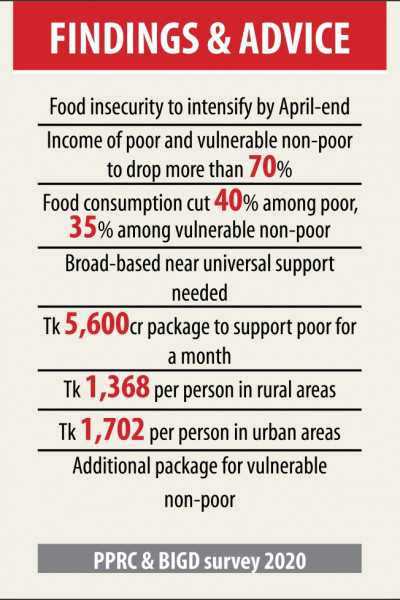Tk 5,600cr needed pronto to push away hunger among poor

Collected
Meals insecurity among the indegent and economically vulnerable population comes with started and the crisis will intensify by the finish of this month if the government will not take any immediate steps, said a recently available study.
"You want to give an aware of the government," explained Hossain Zillur Rahman, executive chairman of the energy and Participation Study Centre (PPRC), which executed the analysis in collaboration with the BRAC Institute for Governance and Development (BIGD).
With the view to flattening the curve on the highly contagious, lethal pathogen, the government on March 26 place the country on shutdown -- a approach that gashed the income of the indegent and the vulnerable non-poor saw their income come crashing by as much as 70 %.
The study, conducted over telephone among 5,471 households in slums in cities and rural areas from April 4 to April 12, found that the indegent and the vulnerable were trying to cope with the current crisis through the use of savings, borrowing and reducing food consumption.
Some 40 % of the indegent and 35 % of the economically vulnerable non-poor had to lessen food consumption because the coronavirus outbreak in Bangladesh in March.
Their savings will go out by in a few days, said Imran Matin, executive director of BIGD, while sharing the findings of the analysis yesterday.
Then, without the support, they will descend into deep trouble, Rahman said.
Subsequently, the study suggested the federal government provide Tk 5,600 crore immediately -- Tk 1,368 for per person in rural areas and Tk 1,702 in cities -- to make sure food security for per month for the practically four crore poor population.
The economically vulnerable population were above the poverty level as their incomes were higher during the pre-coronavirus period, specifically in February. Researchers termed them as 'new poor': their income dropped 71 % since coronavirus took over the national discourse.
Almost 80 % of the vulnerable non-poor have seen income contraction which section of individuals might exceed the poverty line if the situation normalises next month.
"But it is quite unlikely as it seems to us that the crisis will prolong for another month or two," said Rahman, also a former adviser to an instantaneous caretaker government.
The volume of traditional relief has been increased for those who have problems with food insecurity.
"What we wished to say was that the upcoming crisis of food insecurity cannot be tackled through a lumpsum increase in traditional relief activities."
A dedicated package is urgent to aid people facing food insecurity, Rahman said.
Earlier this week, the government allocated Tk 760 crore to transfer cash to poor people.
"There exists a large-scale acute need of basic livelihood support as a result of massive income drop," Matin said.
People should be given a widespread generous support package and traditional back-up thinking should be changed, he added.
Source: https://www.thedailystar.net
Tags :
Previous Story
- Light engineering to greatly help diversify export basket
- SMEs need boost from formal banking channels, say...
- Oracle firmly puts down roots in Bangladesh
- Dhaka stocks end four-week bear run on New...
- Respect to Sir Fazle Hasan Abed
- Over 16,000 Bangladeshi workers deported this year
- The new challenges for our NGOs
- CDC invests $30 million in Bangladesh’s BRAC Bank...